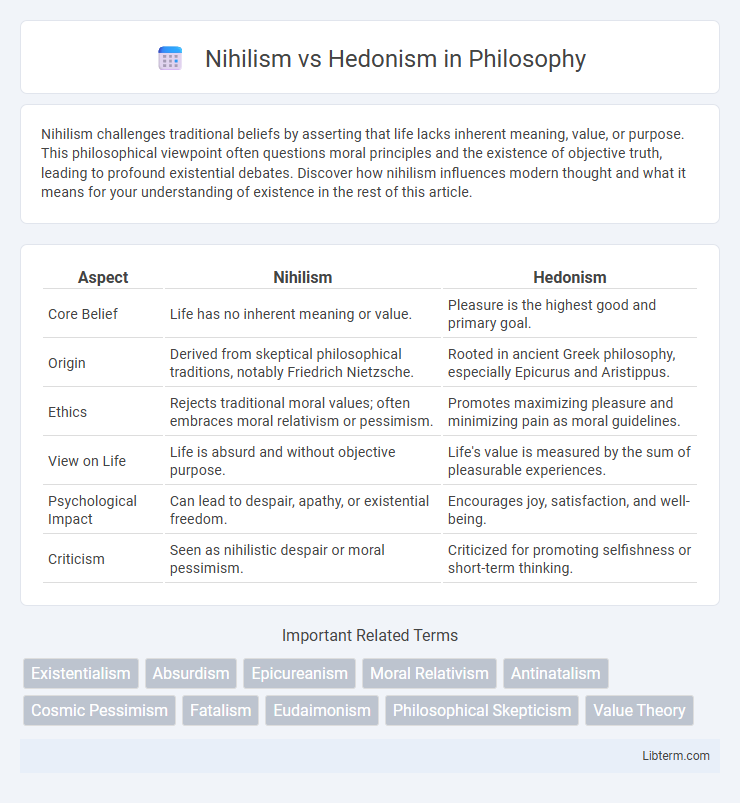Nihilism challenges traditional beliefs by asserting that life lacks inherent meaning, value, or purpose. This philosophical viewpoint often questions moral principles and the existence of objective truth, leading to profound existential debates. Discover how nihilism influences modern thought and what it means for your understanding of existence in the rest of this article.
Table of Comparison
| Aspect | Nihilism | Hedonism |
|---|---|---|
| Core Belief | Life has no inherent meaning or value. | Pleasure is the highest good and primary goal. |
| Origin | Derived from skeptical philosophical traditions, notably Friedrich Nietzsche. | Rooted in ancient Greek philosophy, especially Epicurus and Aristippus. |
| Ethics | Rejects traditional moral values; often embraces moral relativism or pessimism. | Promotes maximizing pleasure and minimizing pain as moral guidelines. |
| View on Life | Life is absurd and without objective purpose. | Life's value is measured by the sum of pleasurable experiences. |
| Psychological Impact | Can lead to despair, apathy, or existential freedom. | Encourages joy, satisfaction, and well-being. |
| Criticism | Seen as nihilistic despair or moral pessimism. | Criticized for promoting selfishness or short-term thinking. |
Understanding Nihilism: Core Beliefs and Origins
Nihilism is a philosophical doctrine asserting that life lacks inherent meaning, purpose, or intrinsic value, originating from 19th-century existential thought and linked to figures like Friedrich Nietzsche. Core beliefs emphasize the rejection of objective moral truths and the absence of any ultimate foundation for knowledge or ethics. This perspective challenges traditional structures and prompts individuals to confront the void of meaning in existence.
Hedonism Defined: The Pursuit of Pleasure
Hedonism centers on the pursuit of pleasure as the highest good and primary motivation in life, emphasizing experiences that maximize happiness and minimize pain. This philosophy promotes sensory enjoyment, gratification, and well-being as essential to human fulfillment. In contrast to nihilism's rejection of inherent meaning, hedonism asserts that pleasure constitutes meaningful existence and ethical value.
Historical Evolution of Nihilism and Hedonism
Nihilism, rooted in 19th-century philosophy with figures like Friedrich Nietzsche, emerged as a reaction against traditional values and metaphysical beliefs, emphasizing the absence of inherent meaning in life. Hedonism, with origins tracing back to ancient Greek philosophers such as Epicurus, advocates for pleasure as the highest good, evolving through Epicureanism and utilitarianism to balance individual pleasure and ethical considerations. Both philosophies reflect evolving responses to human existence, with nihilism challenging existential purpose and hedonism promoting the pursuit of happiness through sensory and intellectual experiences.
Key Philosophers Behind Nihilism and Hedonism
Friedrich Nietzsche is a central figure in nihilism, challenging traditional values and exposing the inherent meaninglessness of life, which he believed required the creation of new values. Epicurus is a foundational philosopher of hedonism, advocating for pleasure as the highest good but emphasizing moderation and the avoidance of pain for a balanced life. The contrast between Nietzsche's existential critique and Epicurus's pursuit of rational pleasure shapes ongoing debates in ethics and philosophy.
Worldviews in Contrast: Meaning vs. Pleasure
Nihilism posits that life lacks intrinsic meaning, asserting that values and purpose are human constructs without objective foundation. In contrast, Hedonism prioritizes the pursuit of pleasure and the avoidance of pain as the primary goals of existence, emphasizing experiential satisfaction over metaphysical meaning. These worldviews clash fundamentally, as Nihilism questions the significance of any pleasure, while Hedonism regards pleasure as the central measure of a meaningful life.
Ethical Implications: Morality in Nihilism and Hedonism
Nihilism challenges traditional moral frameworks by asserting the absence of inherent meaning or objective values, leading to the rejection of absolute ethical standards. Hedonism, on the other hand, bases morality on the pursuit of pleasure and avoidance of pain, emphasizing subjective well-being as the ultimate ethical goal. The ethical implications of nihilism question the foundation of morality itself, while hedonism provides a practical criterion for moral decision-making centered on individual experience.
Psychological Effects: Impact on Mental Health
Nihilism, characterized by the belief in life's inherent meaninglessness, often leads to feelings of despair, anxiety, and existential crisis, negatively impacting mental health. In contrast, hedonism, centered on the pursuit of pleasure and avoidance of pain, can enhance temporary emotional well-being but may result in long-term issues such as addiction or shallow fulfillment. Both philosophies influence psychological states, with nihilism potentially fostering depression and nihilistic hopelessness, while hedonism risks emotional volatility and impaired resilience.
Nihilism and Hedonism in Popular Culture
Nihilism and hedonism often appear in popular culture as contrasting philosophies, with nihilism emphasizing the meaninglessness of life and hedonism focusing on the pursuit of pleasure as the highest good. Characters in films like "Fight Club" and "The Matrix" explore nihilistic themes by confronting existential despair and the absence of inherent purpose. In contrast, media such as "The Great Gatsby" and "Fear and Loathing in Las Vegas" depict hedonistic lifestyles centered on indulgence and sensory gratification.
Societal Influence and Contemporary Relevance
Nihilism questions the inherent meaning and value in societal norms, often leading to skepticism toward established structures and cultural traditions. Hedonism, emphasizing pleasure as the primary purpose of life, influences consumer culture and lifestyle choices by promoting immediate gratification and personal happiness. Both philosophies shape contemporary dialogues on mental health, ethics, and social behavior, reflecting tensions between existential doubt and pursuit of well-being.
Choosing a Path: Balancing Meaning and Enjoyment
Choosing a path between nihilism and hedonism involves balancing the pursuit of meaning with the quest for pleasure. Nihilism challenges the existence of inherent purpose, prompting introspection on value and significance, while hedonism prioritizes maximizing personal enjoyment as a core life principle. Integrating elements from both philosophies can help individuals craft a fulfilling existence that acknowledges life's uncertainties while embracing moments of happiness.
Nihilism Infographic

 libterm.com
libterm.com